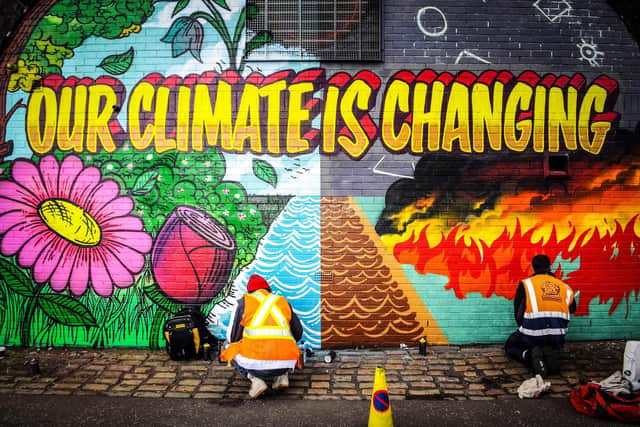Climate change: Scotland's cultural sector can help people engage with the problem – Dr Richard Dixon
If we are to survive the changing climate and the changes we will need to make in our lives, creativity, art and storytelling are an essential part of our journey. This week I had the privilege to join some of the ‘Springboard’ climate and culture sessions. I have written before about the importance of the cultural sector in helping people connect with climate change, and this initiative is another from the excellent organisation Creative Carbon Scotland.
The sessions built on already existing collaborations between climate and cultural organisations and the event describes itself as an online assembly for creative climate action. It aims for no less than helping create a fairer, greener Scotland.
Advertisement
Hide AdAdvertisement
Hide AdI was able to rub e-shoulders with musicians, large and small venue managers, theatre professionals, local authority staff, scientists, archaeologists, poets, conservationists and arts funders, with discussions ranging from how to have a low-carbon live music tour to the role of culture in creating resilient communities, and from culture’s place in climate justice to how to create new narratives of what constitutes a well-being economy – ‘the new good life’.
The core part of the event was the creation of cohorts. These are selected teams of people working together over the four days of activities, culminating in practical action plans to address the challenges each group had chosen to take on. The cohorts were looking at everything from the role of museums and how creative freelancers can contribute to creative input to discussions about 20-minute neighbourhoods and decarbonising classical music tours.
Given the current craziness about the 15-minute, low-traffic neighbourhoods being introduced in Oxford, the 20-minute neighbourhoods cohort must have had fun discussing creative ways to show that these are not part of a socialist conspiracy to lock people in their homes…
My cohort was looking at collaborations between climate and cultural organisations and people. Issues of building trust and seeming to speak different languages featured, as well as the important question of how to meaningfully engage with those most at risk from climate change, when those people are often the most excluded from these discussions.
The group looked at ways forward, including collaborative approaches to funders which demonstrate shared priorities between cultural organisations and climate change bodies, bringing together evidence to make the case for the cross-cutting value of culture and arts in formal education and actively creating more cross-sectoral project opportunities.


Two hundred people registered for this week’s event and the aim is for the people in the cohorts to keep in touch, with quarterly catch-ups with Creative Carbon Scotland as work progresses on the action plans they have developed. In addition, in-person local assemblies across Scotland have already started discussions about climate and culture in their area.
Being serious about climate change means reducing emissions, changing lifestyles and adapting to a changing world. With a combination of great presentations, lively panel discussions and detailed work in cohorts, interspersed with a liberal dose of poetry, Springboard was as practical as it was inspiring in addressing these challenges. I look forward to the follow-up activities bringing the culture sector and climate action close together over the next year.
Dr Richard Dixon is an environmental campaigner and consultant
Comments
Want to join the conversation? Please or to comment on this article.